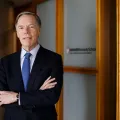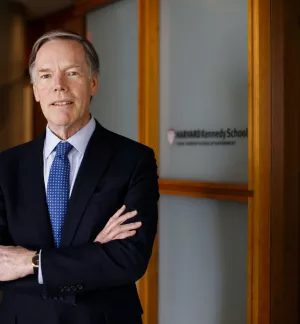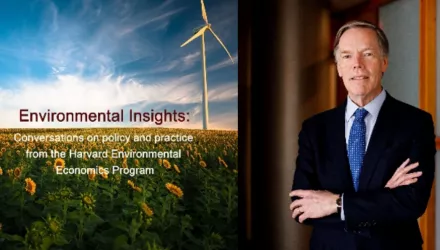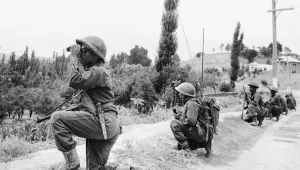A Time for Diplomacy
The Anthony J. Drexel Biddle, Jr. Lecture
Duke University
April 8, 2021
Ambassador (ret.) Nicholas Burns
It is a great pleasure to give this year’s Anthony J. Drexel Biddle, Jr. Lecture here at Duke, albeit virtually due to the extraordinary and seemingly endless pandemic.
It is a special honor because Ambassador Biddle’s diplomatic experience—as FDR’s Ambassador to Norway and Poland in the 1930s, to governments in exile in London during the Second World War, and to Spain for President Kennedy—was significant by any historical standard. Duke is right to honor his life and career dedicated to diplomacy and to the service of the United States.
I am grateful to my friend and former colleague in the United States Foreign Service, Ambassador Patrick Duddy, for asking me to give this year’s Biddle lecture.
I want to salute another friend and fellow member of the Aspen Strategy Group, Duke Professor Peter Feaver, who has one of the sharpest minds, and sharpest wits, of anyone I have known in academic or public life.
As this is a day to honor diplomacy at Duke, I want also to recognize a third friend, Steve Kelly, who has been at the Sanford School since his retirement from the State Department. Steve and I were sworn into the Foreign Service together 39 short years ago in Washington, D.C.
As career diplomats, Patrick, Steve, and I would like to think that we hail from a venerable and respected profession.
The three of us are proud to have been members of the United States Foreign Service. We have each served as diplomats on behalf of presidents of both parties.
But not everyone, it seems, is so enamored of diplomats like us.
Talleyrand, the great French statesman of pre- and post-revolutionary France said famously: “Diplomacy is to lie and deny.”
David Lloyd George, British Prime Minister at the Versailles Conference in 1919 complained that, “Diplomats were invented simply to waste time.”
Even President Kennedy was so frustrated by advice from diplomats that he characterized the State Department as a “bowl of jelly”.
Notwithstanding these colorful criticisms of our profession, I come to Duke today to praise diplomacy, its past and, especially, its future for the United States.
My principal message in this lecture is actually a prediction. By the next decade, if not before, we Americans will come to think of diplomacy as an indispensable asset in the world more than we have in the recent past. In the current complex global landscape, where the U.S. cannot always get our way by force of arms, we will need to view diplomacy as a primary force to enhance America’s global power.
All of us recognize how challenging a time this is for the United States.
President Biden is seeking to stabilize the foundation of American power—by repairing a fractured and crisis-ridden home front, restoring our economy, reinforcing our technological and innovative strength, rebuilding our global alliances in Europe and the Indo-Pacific, and reclaiming American leadership at the Paris Climate Talks, the World Health Organization, and at the United Nations.
As he and his experienced team look out beyond our borders, they can rely on the world’s most powerful and expeditionary military and its most skillful intelligence network.
During the last two decades, our leaders leaned more heavily on our Generals, Admirals, and Intelligence Chiefs than they did on our Ambassadors in safeguarding the nation following the shock of 9/11, our entry into the Afghan War, the invasion of Iraq, the rise of deadly terrorist groups, the destabilization of the Arab World, the threat of nuclear power North Korea, and of nuclear wannabe, Iran, and many other issues.
Looking ahead to the major challenges of this decade and beyond, however, we can no longer depend on the military and intelligence alone. They will be critically important in defending the country from foreign attack and pernicious foreign influence. They will be the first to admit, however, that they cannot face these challenges without a significantly strengthened U.S. diplomatic capacity.
Our country needs a fully revived, restored, and rebuilt State Department and Foreign Service if we are to meet the awesome challenges of our time successfully.
The reasons for this are clear for all of us to see:
First, many of the most difficult and dangerous threats ahead will lend themselves at least as much to our diplomatic power as our military or intelligence power.
To deal with the potentially catastrophic impact of climate change, our diplomats will have to create and nurture a grand coalition of countries to unite in common purpose.
To meet the threat of future pandemics and to learn the truth about the origins of the coronavirus will require diplomatic ingenuity and purpose.
Most wars end with diplomats sparring at a negotiation table. That is where we will need talented, experienced, and forceful diplomats to end the Afghan, Iraq, Syria, and other conflicts from the world that 9/11 created.
Future presidents will need a first-rate diplomatic corps to deal with the threats from global crime and drug cartels, human trafficking organizations, the advance of cyber criminals, and others that wish us ill.
The second reason we will need a stronger State Department and Foreign Service is to contend with perhaps the most difficult problems of all – China’s ambitious bid for global power, Russia’s determined assault on the independence and freedom of its neighbors, the rise in purpose and confidence of the authoritarian world, and its aim to weaken the democratic world.
We will need to expand U.S. diplomatic power to compete successfully with the authoritarian countries. A changing global balance of power has narrowed the gap between the U.S. and its leading adversaries. While the U.S. remains the single, strongest power in absolute terms, China, Russia, and others are gaining their share of relative power. The U.S. will need to lean on its allies in the Indo-Pacific and Europe to help us block China and Russia when they inevitably overreach.
This is where diplomacy comes into play. America’s diplomatic power combines the strength of our alliances and leading coalitions, our economic and technological capacities, fueled by skillful diplomats wielding their unrivaled knowledge of negotiations, history, politics, and culture.
It also includes from time to time the weapons of intimidation and coercion and, if absolutely necessary, the powerful combination of diplomacy and the threat or use of force.
That fusion of diplomatic, military, and intelligence power is how we won the Cold War through containment and how President Clinton stopped the wars in Bosnia and Kosovo. It is how the Obama Administration incentivized Iran to seek the 2015 nuclear deal given the fact that both the U.S. and Israel left the threat of force clearly on the table for them to see and reflect upon.
Diplomacy also works best when far-sighted leaders take charge of a crisis and point the way ahead. Think of:
- FDR and Churchill’s organization of a massive global coalition to defeat Nazi Germany and Imperial Japan.
- Helmut Kohl, Mikhail Gorbachev, and George H.W. Bush’s negotiations to unite Germany in the NATO Alliance and to end the Cold War.
- Nelson Mandela who used a four-year diplomatic negotiation to dismantle and destroy the apartheid regime.
- Angela Merkel who led the world diplomatically in confronting and sanctioning Vladimir Putin following Russia’s illegal annexation of Crimea in 2014.
Diplomacy and negotiations, of course, do not always succeed. At its worst, if diplomacy fails, war, lawlessness, and destruction ensue – Vietnam, Rwanda, and Iraq in the past. Syria, Tigray, Myanmar, and China’s power grab in the South China Sea in the present.
That is one reason why it is so important to integrate effectively the work of ambassadors and Generals combined with the unique power of intelligence officers.
Foreign policy making in the U.S. Government is a team sport. It takes coordination among all the country’s actors to succeed. We diplomats understand that our ability to succeed is often related directly to the intelligence on which we depend and the military partners with whom we share power.
It has long been understood that diplomacy and defense are inextricably tied to each other.
When I was U.S. Ambassador to NATO, the majority of my staff was from the Pentagon – both the uniformed military and Defense Department civilians. We thought hard about aligning our diplomatic moves with our military might. When we responded to the 9/11 attacks, we drew on the resources of both diplomats and warriors. When NATO went into Afghanistan, we thought of it as a combined military and diplomatic mission.
What has been missing in the U.S. government in recent years is a strong, energetic, self-confident diplomatic corps.
President Biden and Secretary of State Tony Blinken have shown they appreciate the need to elevate diplomacy as a first-order priority for the United States.
From their first days in office, they have emphasized their determination to strengthen America’s diplomatic power in the world.
President Biden chose the State Department as the site of his first foreign policy speech. Some of his earliest and most notable appointments immediately strengthened our diplomatic bench behind Secretary Tony Blinken – Ambassadors Linda Thomas-Greenfield, Wendy Sherman, Victoria Nuland, and Samantha Power, as well as an impressive and experienced NSC team led by Jake Sullivan, Jon Finer, Kurt Campbell, Laura Rosenberger, Sumona Guha, and many others.
For President Biden’s new emphasis on diplomacy to succeed, however, the career Foreign Service, in particular, will need to be strengthened dramatically.
It is no secret that the Foreign and Civil Service are at their lowest points in morale and effectiveness in the memory of anyone listening today in this Zoom room.
I began my diplomatic career 41 years ago as an intern at our embassy in Nouakchott, Mauritania in the Sahara Desert. I have witnessed many highs and lows of American diplomacy since.
Frankly, I have been shocked to see the damage done to the career Foreign Service during the last four years. The result is disastrously low morale, a lack of budgetary support, the debilitating departure of some of our most senior career diplomats, the sidelining of the Service for a time, and the resulting lack of confidence in its future by a younger generation of diplomats who will be most critical to its resurrection.
President Biden and Secretary Blinken have a rare opportunity to lead a radical overhaul at the State Department. Under their leadership, this must remain a first-order priority for the administration.
In November just following the Presidential election, two former American Ambassadors, Marc Grossman, Marcie Ries, and I released a Harvard Kennedy School report entitled, “A U.S. Diplomatic Service for the 21st Century.”
Our goal was to recommend the fundamental steps necessary to reform the Foreign Service and to reposition it for success in the future.
Based on conversations with over 200 people inside the U.S. government and beyond in over 40 workshops during the past pandemic year, we reported that the Foreign Service “is confronting one of the most profound crises in its long and proud history.” We recommended a determined, bipartisan effort to revive and restructure it.
Specifically, we called for a new Foreign Service Act by Congress to set a renewed mission and mandate for the 21st century diplomatic corps. The last time Congress passed such an Act was in 1980 when the world was a very different place with very different challenges. than it is now.
We advocated a “relentless focus on diversity” to counteract the woeful lack of progress in the percentage of African Americans, women, Latinx Americans, Asian Americans and other minorities in the senior ranks of American diplomacy.
We called for the creation of a new Diplomatic Reserve Corps and a Mid-Level entry program to ensure the inclusion in the diplomatic ranks of experienced citizens with specialized skills.
Given the proliferation of political appointee Ambassadors at the State Department, we also recommended that, by 2025, 90 percent of Ambassadors should be career appointees, not 70 percent as is the current practice. We also recommended that 75 percent of the powerful Assistant Secretary of State positions be held by career officers.
During the Trump Administration, not a single one of these Assistant Secretary positions was led by a Senate-confirmed career officer. This was the first time in memory that the Foreign Service had been entirely unrepresented at that critical leadership level.
Finally, we proposed to rename the “Foreign Service of the United States” the “United States Diplomatic Service.” We believe it signals transformation and reinforces the vital role our diplomats perform in service to our nation. This new title would begin with the two words, of course, that are most important – United States.
A reinforced career diplomatic corps would help President Biden and his successors from either party to revive American leadership in the world.
President Biden’s great insight has been to see our alliances as the critical asset we have in this long-term battle for global power and the future of democracy.
The NATO Alliance is fundamental to a long-term peace in Europe. It has expanded a zone of security to encompass the great majority of Europeans, East and West. It protects all of us, particularly smaller countries, from the Russian Bear. It will be largely a diplomatic task to return the U.S. to leadership of the Alliance and to maintain allied unity in containing Russia power in the next few days, weeks, months, and years.
The challenge will be more complex in the Indo-Pacific where China is seeking to become the dominant military, economic, and technological power. Chinese muscle-flexing in the South and East China Seas has trampled on the sovereign and legal rights of six other claimants.
Under Xi Jinping’s leadership, Beijing is building a navy, air force, and ballistic missile apparatus designed to contest American naval and air power in the Pacific.
The Chinese have pushed aggressively against their neighbors during the past twelve months. Beijing has violated its commitment to the people of Hong Kong and has suffocated their democratic rights. It continues to harass and intimidate Taiwan. It has picked a fight with India along their long border in the Himalayas. The Chinese government’s brutal subjugation of the Uighur population in Xinjiang Province is yet another human rights outrage the world must address.
In response, the U.S. must use its diplomatic power to strengthen the Quad countries—the U.S., Japan, Australia, and India—in the Indo-Pacific.
Together, those same four countries are now combining to offer vaccines to those in need in the developing world. Together, we should organize to do better during the next pandemic that will surely come in this decade or the next.
In the face of Chinese and Russian authoritarianism and democratic backsliders Turkey and Hungary in NATO, President Biden is right to call for a strengthening of the democratic to defend our turf, and our values and to stand up for those democracies under siege in the world today.
Our diplomats will be on point for America in all these 21st century struggles. The job of establishing the many different coalitions necessary to counteract the authoritarian wave will sit squarely on the shoulders of the women and men of the Foreign Service.
Ultimately, our ability to act will also be a function of how we feel about ourselves as a nation. By this I mean regaining the confidence necessary to act boldly and to dream big on the international stage.
This is an important time in American history. The question on many minds across the world is whether America is declining as a global power; whether we have lost the capacity and will to do great things and to lead a great, global coalition.
If we fail to reform the State Department and fail to mobilize our alliances to prevail in the global debate over the merits of democracy versus authoritarianism, then we will have failed to meet one of the most consequential tests of our time.
If, on the other hand, we succeed in binding together the broad community of democracies and allies around the world, we may well face the China challenge effectively in this decade and the next.
To accomplish this, we will need to think as big and ambitiously as FDR, Truman, and Eisenhower did at another turning point in history.
President Biden’s vision of a strengthening of democracies is a big idea. Forming a U.S.-UK-European Union-Japan coalition to offer a competitor to the Belt Road Initiative is another. Establishing a coalition of the same countries to face down China on its unfair trade commitments is a third. Combining the scientific and innovative power of the Indians, Americans, and Japanese to distribute vaccines globally is a fourth.
Big ideas helped to make America the great power it is today when we had the confidence and vision to launch the Marshall Plan, the Interstate Highway System, and the Gemini and Apollo programs.
Diplomacy in the service of big ideas is critical for the future of American foreign policy.
The ultimate big idea, of course, throughout history has been the search for a state of peace. That is the work of diplomats too.
When I was growing up in the 1960s and 70s outside of Boston, Republican and Democratic candidates for state and federal office would regularly hold up the banner of peace as the ultimate aim of the U.S. government. For many of these veterans of the Second World War, their campaign slogans boiled down to: “Vote for me. I’ll bring you peace.”
Since 9/11 and the two big land wars, most candidates in both parties today campaign by saying, “Vote for me, I’ll make you secure.” The goal of peace has largely disappeared from our national discussion.
For those who might think that the search for peace is either naïve or simply unachievable in the world today, consider the words of a combat veteran of the war in the Pacific, President John F. Kennedy, about peace.
“Too many of us think it is impossible”, he said in his landmark American University Commencement address in June 1963. “But that is a dangerous, defeatist belief. It leads to the conclusion that war is inevitable—that mankind is doomed—that we are gripped by forces we cannot control.”
Kennedy’s message in that memorable speech was to affirm the ultimate responsibility of diplomacy to create a new world worthy of American ideals.
Let me conclude on a final point.
Diplomacy is most successful when it draws on the core values and ambitions of the country it serves. That means American diplomacy must be based both on a commitment to defend our economic, military, and strategic interests but also America’s commitment to human and religious rights, the rule of law, civil liberties, and democratic freedoms. This is what separates American diplomacy from that practiced by Russian and Chinese diplomats.
Diplomacy helped to make America great during and after the Second World War. It can help to make America the great and good power it needs to be again in the decades ahead.
Thank you very much for this opportunity to deliver the Biddle lecture at Duke today.
Burns, Nicholas. “A Time for Diplomacy.” April 19, 2021




